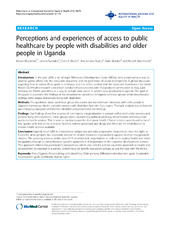| dc.contributor.author | Mulumba, Moses | en_US |
| dc.contributor.author | Nantaba, Juliana | en_US |
| dc.contributor.author | Brolan, Claire E. | en_US |
| dc.contributor.author | Ruano, Ana Lorena | en_US |
| dc.contributor.author | Brooker, Katie | en_US |
| dc.contributor.author | Hammonds, Rachel | en_US |
| dc.date.accessioned | 2014-10-08T13:14:05Z | |
| dc.date.available | 2014-10-08T13:14:05Z | |
| dc.date.issued | 2014-10-08 | eng |
| dc.identifier.issn | 1475-9276 | |
| dc.identifier.uri | https://hdl.handle.net/1956/8612 | |
| dc.description.abstract | Introduction: In the year 2000, a set of eight Millennium Development Goals (MDGs) were presented as a way to channel global efforts into the reduction of poverty and the promotion of social development. A global discussion regarding how to renew these goals is underway and it is in this context that the Goals and Governance for Global Health (Go4Health) research consortium conducted consultations with marginalized communities in Asia, Latin America, the Pacific and Africa as a way to include their voices in world’s new development agenda. The goal of this paper is to present the findings of the consultations carried out in Uganda with two groups within low-resource settings: older people and people living with disabilities. Methods: This qualitative study used focus group discussions and key informant interviews with older people in Uganda’s Kamwenge district, and with persons with disabilities from the Gulu region. Thematic analysis was performed and emerging categories and themes identified and presented in the findings. Findings: Our findings show that a sense of community marginalization is present within both older persons and persons living with disabilities. These groups report experiencing political sidelining, discrimination and inequitable access to health services. This is seen as the key reason for their poor health. Clinical services were found to be of low quality with little or no access to facilities, trained personnel, and drugs and there are no rehabilitative or mental health services available. Conclusion: Uganda must fulfil its international obligations and take progressive measures to meet the right to health for all its peoples, but especially allocate its limited resources to proactively support its most marginalized citizens. The growing impetus within post-2015 development negotiations to redress in-country health and other inequalities through a comprehensive systems approach is of importance in the Ugandan development context. This approach reflects the participant’s perspectives, which also calls for a more equitable approach to health and development as opposed to a narrow, vertical focus on specific population groups, as was the case with the MDGs. | en_US |
| dc.language.iso | eng | eng |
| dc.publisher | BioMed Central | eng |
| dc.rights | Attribution CC BY | eng |
| dc.rights.uri | http://creativecommons.org/licenses/by/4.0 | eng |
| dc.subject | Africa | eng |
| dc.subject | Uganda | eng |
| dc.subject | Persons living with disabilities | eng |
| dc.subject | Older persons | eng |
| dc.subject | Millennium development goals | eng |
| dc.subject | Sustainable development goals | eng |
| dc.subject | Go4Health | eng |
| dc.subject | Human rights | eng |
| dc.title | Perceptions and experiences of access to public healthcare by people with disabilities and older people in Uganda | en_US |
| dc.type | Peer reviewed | |
| dc.type | Journal article | |
| dc.date.updated | 2014-10-08T03:03:59Z | |
| dc.description.version | publishedVersion | en_US |
| dc.rights.holder | Copyright 2014 Mulumba et al.; licensee BioMed Central Ltd. | |
| dc.rights.holder | Moses Mulumba et al.; licensee BioMed Central Ltd. | |
| dc.source.articlenumber | 76 | |
| dc.identifier.doi | https://doi.org/10.1186/s12939-014-0076-4 | |
| dc.identifier.cristin | 1188637 | |
| dc.source.journal | International Journal for Equity in Health | |
| dc.source.40 | 13 | |

